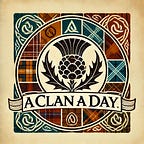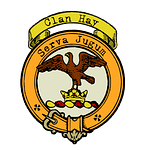Welcome back to the “A Clan A Day Podcast,” brought to you by BagTownClans.com.
I’m your host, Colin MacDonald. Today, we dive into the history of Clan Rose, a Highland clan whose lineage and legacy are as unique as their motto: “Constant and True.” Though often confused with Clan Ross due to their similar-sounding names, Clan Rose stands apart, with origins rooted in the Norman conquest and a history deeply tied to the Scottish Highlands.
The story of Clan Rose begins in the 12th century with Hugh Rose of Geddes, whose family arrived in Scotland during the reign of King David I. Initially thought to have Irish origins, the Roses are now widely believed to be of Norman descent. Their lineage traces back to the Ros family of Caen, Normandy, who accompanied the Norman kings to England after the conquest in 1066. By the mid-13th century, the family migrated to the Highlands, establishing themselves in Nairn.
The early Roses held lands in Geddes, but their fortunes changed when Hugh Rose, son of the first chief, married Mary de Bosco, heiress to Kilravock. This union brought the lands of Kilravock into their possession, and from that point, Kilravock became synonymous with the clan’s leadership. From the 13th century to the modern day, the Roses have maintained an unbroken line of chiefs headquartered at Kilravock Castle, a record unmatched by many Highland clans.
The Norman heritage of the Roses is evident in their coat of arms, which features three water bougets, symbols of their roots in Normandy. These emblems link them to other Norman families, including the Roos family of England, but the Roses developed a uniquely Scottish identity. Loyal to the Crown and steadfast in their commitments, the Roses became known for their integrity and diplomatic skill in navigating Scotland’s turbulent history.
Throughout their history, the Roses formed strong alliances, including a close relationship with the MacKintosh clan. This bond was formalized in 1643 when the MacKintoshes were made responsible for “broken men” of the Rose name, further cementing their friendship. The Roses also played a role in the French Revolution. J.A. Rose, a member of the clan, rose to prominence in Paris as an usher of the National Assembly. He became a trusted confidant of King Louis XVI and Queen Marie Antoinette, warning them of their imminent executions. His actions earned him a reputation akin to the fictional Scarlet Pimpernel, but his legacy is one of real historical significance.
Kilravock Castle, built in 1460 by Hugh Rose, the seventh chief, stands as a testament to the clan’s endurance. Situated on the banks of the River Nairn, the castle served as the backdrop for many notable events. Mary, Queen of Scots, once sought refuge there and later wrote fondly of the Roses as trusted allies. Her son, King James VI, also visited the castle, reportedly treating its laird with great respect.
During the Jacobite risings, Kilravock Castle hosted both Bonnie Prince Charlie and the Duke of Cumberland within days of each other in 1746. Prince Charlie admired the peaceful life of the laird, while Cumberland, despite being the leader of the forces opposing the Jacobites, expressed his approval of the clan’s hospitality. This delicate balancing act underscored the Roses’ ability to navigate Scotland’s volatile political landscape.
The Roses’ contributions extend beyond politics and war. They are celebrated for their cultural and intellectual pursuits. Elizabeth Rose, the 19th Lady of Kilravock, was a patron of the arts and literature. Robert Burns visited her during his Highland tour in 1787 and was struck by her refinement and hospitality. Burns even mentioned his visit in his writings, a testament to the Roses’ impact on Scotland’s cultural tapestry.
Kilravock Castle remained in Rose hands until 1984 when it was transferred to a Christian organization. However, the legacy of the Roses continues under the leadership of David Rose, the 26th Baron of Kilravock. Though the castle is no longer a family residence, it remains a symbol of the clan’s storied past.
From their Norman beginnings to their steadfast presence in the Highlands, Clan Rose embodies resilience, loyalty, and refinement. Their history is a tapestry woven with alliances, cultural contributions, and an unbroken line of leadership spanning centuries. Constant and true, the Roses stand as a remarkable example of the enduring spirit of Scotland’s clans.
Thank you for joining us for this episode of “A Clan A Day Podcast.” Be sure to tune in tomorrow as we explore the history of another remarkable clan. I’m Colin MacDonald, and as always, slàinte mhath!










